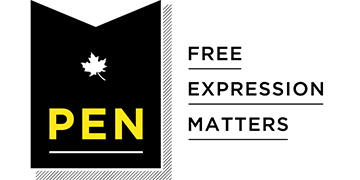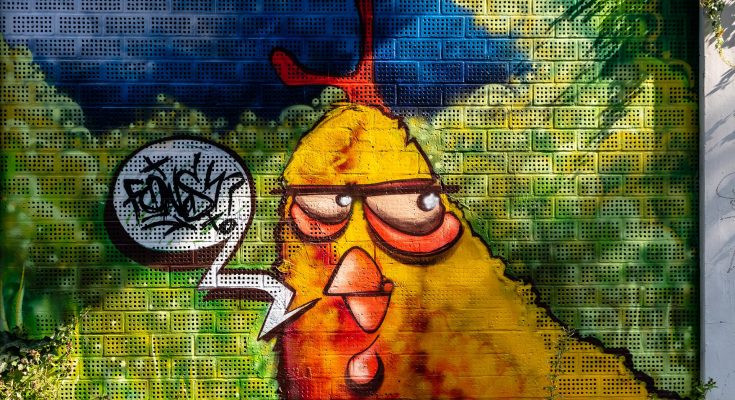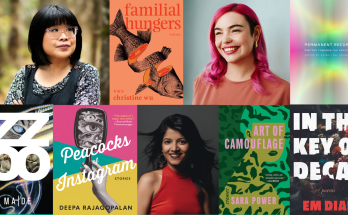Amy Lai is a lawyer and author of “The Right to Parody” (Cambridge University Press), an upcoming book on free speech and higher education (under contract with University of Michigan Press), and a personal blog on health, lifestyle, travel and politics. She is the winner of PEN Canada’s 2021 Ken Filkow Prize for freedom of expression.
PEN Canada: You have written that parody deserves broader protections from censors who weaponize copyright law. Where has copyright been most effective for censorship? Conversely, where has parody worked best for activism and protest?
Amy Lai: In pre-2019 Hong Kong, when its local government was less authoritarian but nonetheless still a puppet of Beijing, many people suspected that copyright was used to take down materials offensive to the Hong Kong and Chinese governments and private companies. However, no such cases were taken to court. In Hong Kong today, the draconian National Security Law means that the government no longer needs to weaponize copyright law.
Parody has always been an effective tool for activism and protests. It works well almost everywhere because it builds on well-known works that resonate with the public. Throughout history, many people have been jailed or even killed for mocking authority through parody. This, too, is a testimony that it works well.
PC: Your forthcoming book argues against deplatforming speakers who have agreed to a civil discussion of controversial views. What would you say to someone who objects that you can’t have reasonable conversations with people who embrace hateful, discriminatory or anti-democratic ideas?
AL: I would say that “hate” is very subjective and must not be confused with hate speech which is narrowly defined by the law. In many cases, people simply express their disapproval of something and that is not hate. We must beware of “concept creep,” and avoid extending the meanings of words and concepts until they lose their essential meanings. We must also avoid conflating criticism of a government with promoting hatred of its people. I would say that hating certain things is totally reasonable and may even be morally obligatory. If, for example, a government is run by illiterate and uneducated gangsters who keep violating citizens’ human rights, I would argue that we have a moral obligation to detest these actions and one should take pride in acting righteously and courageously to express this hatred.
Respectful discussions, especially in an academic setting, are seldom discriminatory or anti-democratic in themselves. The right to free speech in fact entails the right to express opinions that may be considered discriminatory or anti-democratic. If you think people are ill-informed, you should try to change their minds with argument; if they can’t be persuaded, you can at least inform and persuade your audiences. The academic community—and society in general —has a lot to gain from fostering dialogue instead of shutting people down. Suppose my colleague invites an official of the Chinese government to campus, I would likely be appalled by even the thought of listening to such a person. I have two options: avoid the talk for my peace of mind, or participate despite my misgivings for the sake of exposing and ridiculing the person and the government.
Let’s say some people have nothing but ill intent and their opinions are truly hateful and discriminatory. Shutting them down doesn’t make their hate and discrimination disappear. It only drives them underground which could lead to even worse consequences. If something is so bad, wouldn’t you want to denounce it publicly?
PC: What role should the FAANGs play in arbitrating freedom of expression in a global public sphere? Can initiatives like Facebook’s Supreme Court make a meaningful difference to the way we currently handle online hate and censorship?
AL: Social media companies should apply the same principles of free speech uniformly, instead of prioritizing the rights or feelings of certain groups over others. Unlike most other private companies, they are responsible for creating and maintaining a public sphere. They should not be allowed to censor expression that doesn’t align with certain beliefs in order to protect their corporate image.
Facebook’s Supreme Court may make a meaningful difference if, and only if, it is overseen by fair-minded people who do not give special consideration to particular groups. It may be a promising step given the outsize power of big tech companies and the fact that their interests often don’t align with those of the global community of users. Many friends in Hong Kong are regularly “Facebook-jailed” — temporarily suspended for posts that were deemed “hateful” and a violation of Facebook’s so-called community standards. Typically these are posts that criticize the Chinese government and the conduct of its officials, apologists, or rabid nationalists. None contain hate speech.
There are reports of Facebook hiring Chinese nationalists on work visas to censor messages critical of their government. It is a shame that an American company would compromise its First Amendment values, apparently for the sake of appeasing an authoritarian government and gaining access to its markets. It isn’t just Facebook. Twitter has failed to apply its speech regulations equally to all groups. It promptly deletes what it deems to be hateful comments about certain groups, while ignoring borderline hate speech that targets others. One example is a post by a British reporter saying “Hitler was right.” during the Israel-Palestinian conflict. This post—both unprofessional and borderline illegal in the U.K.—was later deleted by the reporter herself but not by Twitter.
Initiatives such as “Supreme Court” make sense if they can ensure that freedom of speech and freedom of information are upheld and that the same principles are applied to users from all groups and the above phenomena will not happen again.
PC: In his selection of the five best books on free speech, Timothy Garton Ash notes that a book by Nobel laureate J.M. Coetzee concludes that “the state of being offended is always the mark of someone who’s unsure of their own position, it’s a mark of weakness. It’s the mark of the bully and the buffoon … In saying, ‘I am offended,’ you’re revealing something about yourself.” Do you agree?
AL: I agree, especially if it refers to being offended by the mere discussion of topics. One example in my upcoming book, is the evidence-based assertion, in a discussion on weight and productivity: “Healthy weight correlates with high work productivity. That statement should not offend people who are overweight or whose weight falls outside the healthy range. After all, they may be exceptions to the statement, or they may work extremely hard to make up for the slight lack of productivity due to their weight. They might also take it as sound advice. I would say that people who choose to take offence at the statement are insecure and weak. Insecurity breeds bullies, and in this case, it can lead to the bullying or “thin-shaming” of people who are fit and have a healthy weight. This is fairly common in a society driven by extreme political correctness, where unhealthy weight is normalized and bullying fit/slim people is excusable while doing the same thing to overweight people is not. This is truly pathetic.
A statement about weight and productivity made in the context of a legitimate discussion is very different from, say, calling a colleague “fat ass.” That is obviously a personal attack. When you attack people, of course they get offended; not necessarily by the content of the statements but by your rudeness. In Canada I’ve encountered mainland Chinese immigrants who mock the “shitty Mandarin” of Hong Kong immigrants. Most of my Hongkonger friends know they do not speak good Mandarin but insulting them for it — in Canada — is just rude. If Hongkongers take offence, it is less because of the content than the rudeness.
Therefore, I agree with Coetzee’s statement, but it must not be taken out of context. People should not take offence at the discussion of topics, but they have every reason to be offended by personal attacks.
PC: What do you see as the most important freedom of expression problems in Canada and the United States? How different are these to issues you have written about in Hong Kong and elsewhere?
AL: Many people, especially the younger generations, in Canada and the United States seem to take their freedom of expression for granted and willingly give it up. Meanwhile, Hongkongers who enjoyed many liberties, including freedom of expression, under British rule have been losing these liberties since its handover to China. Few Hongkongers take this freedom for granted and many have risked their lives and well-being to reclaim it.
This phenomenon is more obvious in universities. It seems that many American and Canadian academics and students believe that universities should be “safe spaces.” Hong Kongers don’t use that phrase, but I would imagine that for many of them, a safe space would be one free from bullets, tear-gas, arbitrary detention, and surveillance. For Americans and Canadians who have never been shot, tear-gassed or even punched, a safe space is one that protects them from lawful but offensive opinions and ideas—those that somehow “trigger” them and make them feel “unsafe.” As universities should value freedom of inquiry, this development in democratic countries is both saddening and concerning.
The sad reality is that many Canadian universities actively shut down speakers who offer opinions that challenge mainstream ideologies. We all know stories of academics and students getting punished in various ways for not subscribing (fully) to those ideologies (This has not happened in many parts of Europe, e.g. Germany). The current principal of a well-known Canadian university publicly suggested that freedom of expression is a Eurocentric idea that leads to the oppression of non-white people and needs to be remade. I, and numerous Canadians I know, found his suggestion very Orwellian and even reminiscent of “Freedom is slavery.” As a minority (and a triple one—as a foreign-born Asian woman) I can draw upon numerous examples to explain why he could not be more wrong. A nobleman who lived during the Sung Dynasty a thousand years ago said that “it would be better to die for speaking the truth than to stay alive by remaining quiet.” I am sure that similar examples can be found in every culture.
Social problems like racism and sexism certainly need to be addressed and freedom of expression does have limits (and they are reflected in laws on hate speech, among others), but suggesting that freedom of expression is Eurocentric and anything less than a universal democratic principle is both very ill-informed and very risky. It may be excusable for radicalized students to get riled up by offensive opinions and, in some cases, to act like Red Guards when trying to shut down expressions they don’t approve of. After all, they are young. It may even be excusable for inexperienced academics, who graduated not long ago, to act a little too passionately for causes they advocated for in their dissertations and forget their duty to facilitate respectful debates. But it is unthinkable and despicable for seasoned academics and administrators to hold their deeply-held ideologies as some kind of religion, shut down respectful discussions which challenge them, and make Orwellian statements. (One academic even advocated the use of illegal means, e.g., pulling fire alarms, to shut down discussions that they deemed offensive). Unfortunately, some of those educated elites who remind me of the leaders of the Cultural Revolution are the most vocal and determined to remain as gatekeepers.
Talking about China’s Cultural Revolution, many universities are too reliant on foreign money and have compromised their freedom of expression, not to mention the quality of their teaching. I recall a political science professor who admitted that he would not use the head of the Communist Party as an example of a contemporary dictator, for fear of offending Chinese students in his class. Instead, he used former U.S. President Donald Trump (despite that he was elected democratically and had to work within a democratic system). Thus, the two main examples of a dictatorship used in his class were: Hitler and Trump. This indicates not only a severe lack of moral courage but also intellectual dishonesty (or perhaps indoctrination): the criteria for a real dictator are hardly subjective. (How many people have escaped from China to the U.S. in a single year? How many political refugees has the U.S. produced over the past decade?) This unfortunate trend is also found in the wider society: I do not need to cite examples of how big companies and celebrities avoid taking a stand against China. Universities should be held to a higher standard. I highly doubt that young people can receive a quality education from universities full of such academics. Unfortunately, these institutions are now run as business enterprises and have failed to fulfil their role as bastions of free expression.
If freedom of speech and freedom of inquiry are not valued in universities, we cannot expect them to be protected in workplaces. Look at Hong Kong now. If Canadians (and, to a lesser extent, Americans) do not wake up now and resist the rampant cancel culture, it will be too late. Do we want this nation to go down the path of authoritarianism?
PC: What books and/or writers do you recommend to people who would like to know more about the big freedom of expression questions of our time?
AL: The best book is George Orwell’s Nineteen Eighty-Four. (My professor at Cambridge said his Animal Farm has far more literary values, but free speech aside, I just love this one more!) It is so layered and so relevant to contemporary society. I especially like that its portrayal of a totalitarian regime readily applies to all dictatorships regardless of where they fall in the political spectrum. I hope it becomes a must-read in every Canadian high school. Sadly, it might get banned in Hong Kong. I deeply appreciate Timothy Snyder’s advice in On Tyranny, about how to respond to authorities that seek to usurp our fundamental freedoms. (On free speech, for example: “Do not obey in advance.”) Oftentimes, repressive governments gain power because people willingly give up their rights. Those who want to learn about events outside Canada should read Hong Kong activist Joshua Wong’s Unfree Speech: The Threat to Global Democracy and Why We Must Act, Now.
Photo credit: Image by Herbert Aust from Pixabay




